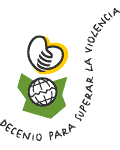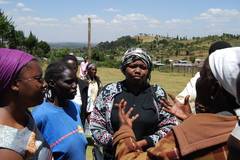Reflections by Ms Nyaradzai Gumbonzvanda
Ms Nyaradzai Gumbonzvanda, general secretary of the World Young Women's Christian Association (World YWCA), Zimbabwe, was part of the Living Letters solidarity team sent to Kenya by the World Council of Churches (WCC) from 30 January to 3 February 2008.
Read her personal reflections and experiences:
8 February 2006
1. Mission Objectives:
The World YWCA and myself deeply appreciated the request to join the WCC Living Letters to Kenya. The mission's objectives were to express the solidarity of churches worldwide with the Kenyan churches at a particularly challenging time and to learn how best the international fellowship of churches can support Kenyan churches' efforts towards peace and reconciliation. The delegation consisted of Rev. Dr Clifton Kirkpatrick, stated clerk of the Presbyterian Church (USA) and president of the World Alliance of Reformed Churches (WARC), United States; Ms Nyaradzai Gumbonzvanda, general secretary of the World Young Women's Christian Association (World YWCA), Zimbabwe. Prelate Dr Stephan Reimers, member of the board of the Church Development Service EEDand representative of the Evangelical Church in Germany (EKD) and EKD's to the European Union, Germany; Rt Rev. Thomas Olmorijoi Laiser, Bishop of Arusha, Evangelical Lutheran Church in Tanzania; Mr Graham Gerald McGeoch, ministerial candidate of the Church of Scotland and member of the WCC central and executive committees, United Kingdom; Rev. Stig Utnem, former general secretary of the Council on Ecumenical and International Relations of the Church of Norway; Dr Geeske Zanen, World YWCA board member, Netherlands. Support staff being sent by the WCC to accompany the delegation included Rev. Dr Elenora Giddings-Ivory, Dr Aruna Gnanadason and Mr Juan Michel.
This was the third of such Living Letters commissioned by the WCC with the first two having been to the United States of America after the September 11, and the second to Sri Lanka.
2. The various meetings,
visits and interactions were very strategically planned to provide an insight into the political, socio-economic history of the country, background to the post election violence and its degeneration into community conflict and revenge attacks. What was most striking was the demographic information especially as it relates to the youth as voters, the campaign messages, the expectations of the results among other issues. Equally important for me on the mission was the analysis on the country's institutions and their internal capacity to address the current crisis confronting the country. I was especially focused on exploring the role of women and young people, the impact of the violence on their lives and the extent to which their specific issue and voices were being integrated into the various responses.
3. Hearing the Unheard voices.
The NCCK team was excellent in organizing for the mission ensuring that we met with the church leadership in Kenya, the Government officials, the opposition, the Kenya Religious Leaders Forum, Nakuru Church leaders and the local leadership in Ndeffo and Mauche. It was great that the YWCA Kenya together with AACC had organized for a meeting with women, to which over 50 participated. Women were very marginal in the various meetings. No women were present in the meetings with government and opposition. At least 4 women were present in the meeting with the Nairobi Church Leaders and we received a briefing on what action they are taking to respond to women's reproductive health and protection issues. The female NCCK Porogramme Officer for Capacity Building was present. Extra effort had to be made during the field visit for women to have an official opportunity to share their views. The other voices that I did not hear during this mission were those of young people (except in Mauche), of persons with disability and of people living with HIV & AIDS. It is in recognition of this lack of voices from women in situations of crisis that the UN Security Council passed resolution 1325, and the AU Passed the Solemn Declaration on Gender Equality as well as the Women's Protocol. I would therefore recommend strongly that the church puts extra effort in giving visibility to the voices and issues affecting women, young people, persons with disabilities.
4. The Key Issues.
The mission made it quite evident that there are multi-layered issues surrounding the crisis in Kenya. Most people stated that the management of the elections and especially the controversy surrounding the Presidential result was only a trigger of the long standing issues plaguing the country. The list of concerns included historical land issues in the Rift Valley with its roots in the colonial and post colonial actions in Kenya; the constitutional reforms that have not been concluded especially on issues of power sharing and decentralization/devolution/majimboism; high levels if inequalities in Kenya defined by region, class, gender, age, ethnic identities among others. The high level of inequalities in income and employment was at the centre of the mobilization and campaign messages. It is also evident that the violence in Kenya had a number of specific characteristics that included a) post election spontaneous violent protests especially in Nairobi and Kisumu/Western, b) community conflict in Rift Valley, c) revenge attacks mostly in Rift Valley, Nairobi and Central Province, d) police violence characterised by the "shot to kill" order, and e) the criminal gangs taking advantage of the general breakdown in law and order.
5. Impact of the Kenya Crisis.
The high number of displaced mostly women, children and young people was quite deplorable. The wanton destruction of lives and property will remain etched in my memory. Most painful are the cases of sexual violence against women and girls, without at time adequate information on how many have been violated and what services they have received, i.e. counseling or legal, and whether the perpetrators will ever be apprehended. The levels of mistrust, pain, hatred and hardened positions generated by the crisis was quite evident. Tribal sentiments were effectively exploited by the political elite in search of power and position in ways that divided the nation. The relocation of people assisted, voluntary and forced was a manifestation of the fear, lack of security and intolerance within communities.
6. Recommended actions especially by the church.
a) Advocate for the church and women to be effectively and formally involved in the mediation process. Civil society and faith based organizations must support the on-going mediation by Kofi Annan facilitated by the African Union, not only in finding a win-win solution to the political crisis, but also laying the ground for the country to address the underlying issues such as land, constitution and devolution, in a way that addresses issues affecting women and young people.
b) Continue to support the community peace building efforts sustaining the initiatives by NCCK such as the dialogues of church leaders and elders across communities.
c) Provide space and opportunity for effective participation of women and young people to the peace building effort. The inclusion of the YWCA Kenya General Secretary in the Religious Leaders Forum is highly commendable.
d) The church's response to the humanitarian crisis must take concrete and doable actions towards protection of the rights of women and children and especially on issues of sexual violence and abuse, specific situation of widows, female and child headed households, persons with disabilities as well as access to treatment and care for persons living with HIV and AIDS.
e) Noting that the issue of Kenya is within the AU and UN agendas on peace and security, the WCC, YWCA and other organizations must actively contribute to the discussions at these Africa and global level in support of the country level initiatives, in a way that fosters the Decade Against Violence, and the 26th World YWCA Council's Resolutions on UN 1325 and Women's Human Rights.
More information on the Living Letters visit to Kenya
National Council of Churches in Kenya
Background information on the Living Letters visits




